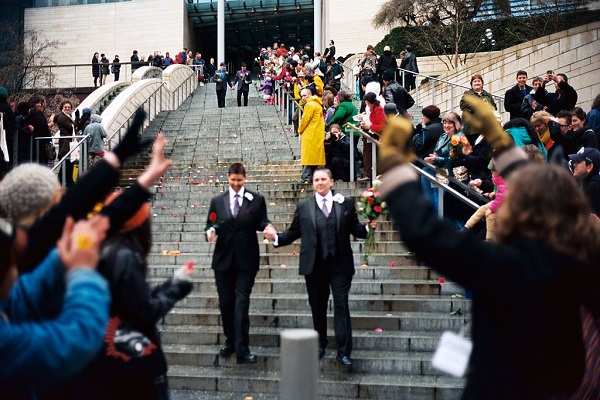
Texas officials can refuse same-sex marriage licences and weddings because of religious beliefs, state Atty. Gen. says
- By Alison Lesley --
- 02 Jul 2015 --
Texas Atty. Gen. Ken Paxton said that justices of peace, judges, county clerks and their employees have “constitutional and statutory rights protecting their freedom of religion”
U.S. Supreme Court’s long-awaited decision about same-sex marriage has raised new legal questions. In Texas, the state attorney general has stated that government employees can, based on their religious beliefs, refuse to issue marriage licenses for gay and lesbian couples and perform same-sex weddings despite the Supreme Court’s ruling.
Texas AG will support county clerks refusing to issue same-sex marriage licenses http://t.co/vdPPK3ukXN
— Taryn (@TarynOnthenews) June 29, 2015
According to the Supreme Court’s decision, the right for same-sex couples to marry is enshrined under the due process and equal protection clauses of the 14th Amendment. In his non-binding opinion, issued last weekend, Texas Atty. Gen. Ken Paxton said that justices of peace, judges, county clerks and their employees have “constitutional and statutory rights protecting their freedom of religion” under the 1st Amendment, the Los Angeles Times reports.
Mr. Paxton’s opinion has caused confusion in Texas with some officials licencing gay and lesbian couples while others seeked for further legal advice. In Louisiana, Gov. Bobby Jindal voiced opinions similar to those of Mr. Paxton. Gov. Jindal has sent out a memo in which he wrote that local officials with conflicting religious beliefs should be able to opt out of granting marriage licenses to same-sex couples.
There are opposite views on the nature of the question: Neel lane, a San Antonio-based attorney said that issuing a marriage license “is no different than issuing a hunting license, a fishing license or a driver’s license,” while others emphasize the constitutional religious aspects in the issue. Kelly Shackelford, President and Chief Executive of the conservative legal group Liberty Institute, said that the Supreme Court’s decision and the legal confusion that has followed can lead to a new battle on religious freedom in the United States.
As of June, eighteen countries in the world have legalized same-sex marriage. The U.S. Supreme Court voted on the issue 5 – 4.


















